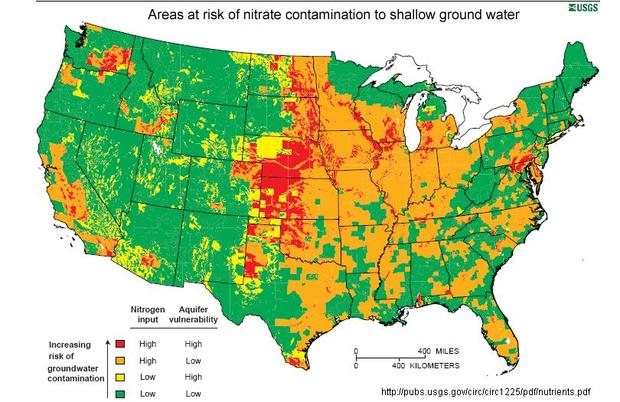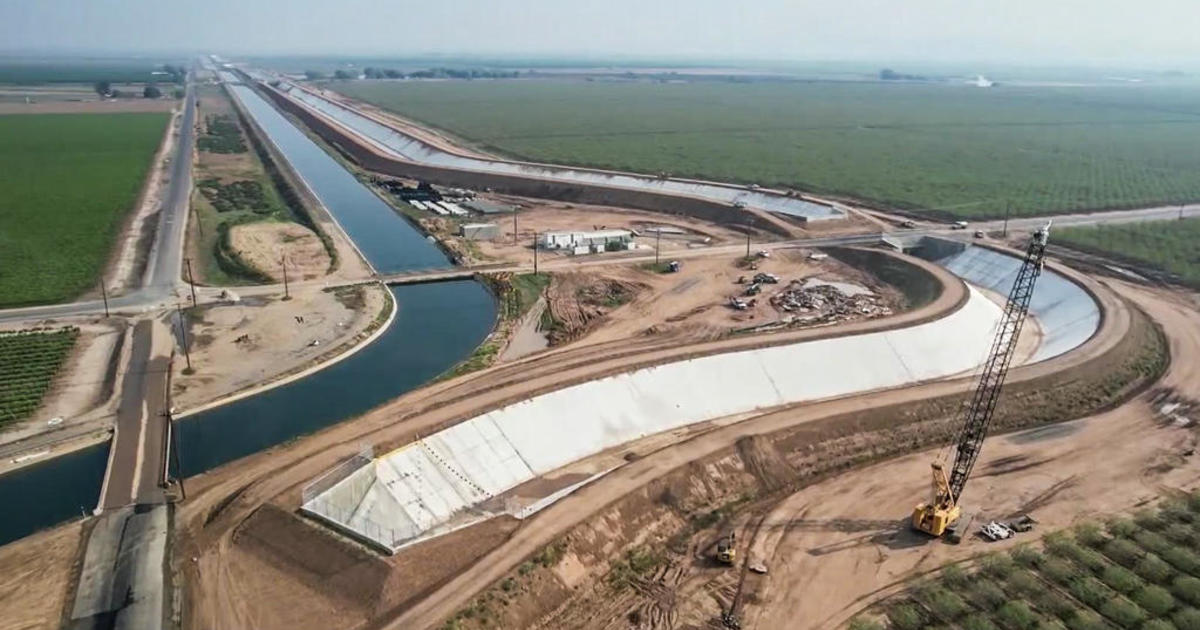Fertilizers Adding Dangerous Levels Of Nitrates To California Groundwater
SAN FRANCISCO (CBS SF) -- The very substance that helps make California's food grow could be making families sick.
Nitrates from fertilizers sprayed onto California crops are ending up in drinking water aquifers and have negative health effects on residents, according to the first-ever California nitrogen assessment.
The California Nitrogen Assessment, released this week by the Agricultural Sustainability Institute at the University of California at Davis, evaluates the impact of nitrates from fertilizers on the human and natural environment.
While nitrogen, in the forms of nitrate, nitrite, or ammonium, are essential to help plants grow their leaves, excess nitrogen escapes the field and flows into groundwater, waterways and the air.
But the World Health Organization, as well as California and other state governments, say "blue baby syndrome," or methaemoglobinemia, is caused by high levels of nitrates in drinking water. The disease can cause a baby to turn blue around their mouth, hands, and feet due to a lack of oxygen. Some cases are fatal.
The UC researchers said it remains unclear what nitrate concentration levels cause the syndrome.
The assessment states that "nitrate levels in groundwater have increased over the past several decades, and some parts of the state now exceed federal standards for safe drinking water."
According to the U.S. Environmental Protection Agency, an estimated 15,004 square miles of California, or roughly a tenth of the state, has groundwater with nitrate concentrations greater than 5 mg per litre, which is half the EPA's maximum contaminant level for nitrate. California ranked only behind Texas for the largest estimated area with groundwater with that level of nitrate concentrations.
The UC Davis assessment, which spanned seven years, states that agriculture is the primary cause of excess nitrogen in California drinking water and that each year nearly 419,000 tons of nitrogen leach into groundwater, with 88 percent of that nitrogen coming from cropland.
Boiling water does not remove nitrate from drinking water, according to WHO.
University of Washington pediatric experts say nitrates can also be present in significant amounts in vegetables, including spinach, beets, lettuce, cabbage, green beans, squash, carrots, and turnips and should be avoided until a baby is 7 months old.
A 2013 study published in the Environmental Health Perspectives journal found that prenatal nitrate intake from drinking water is associated with neural tube defects, oral cleft defects, and limb deficiencies in offspring.
The release of nitrogen into the air also aids in the formation of air pollutants that have adverse effects on respiratory and cardiovascular health in humans. The International Agency for Research on Cancer concludes that consumed nitrate and nitrite are "probably carcinogenic to humans."
To mitigate the high levels of nitrates and nitrogen in California's drinking water, UC scientists are working with farmers to reduce fertilizer use and address water quality concerns.
According to the State Water Resources Control Board's Division of Water Quality, 800 of 12,158 public wells, or 15 percent, sampled between January 2006 and May 2016, had at least one detection of nitrate above the maximum containment levels, with most of those high-level detections occurring in Los Angeles, Tulare, Kern, and San Bernardino counties.
On average, the assessment found, about half the nitrogen applied to crops is lost to the environment.
UC researchers have found that the irrigation water used to fertilize vegetables in California already contains a substantial portion of the fertilizer needed to grow certain crops, meaning farmers can reduce the amount of additional fertilizer they apply to their crops.
UC even made an app, CropManage, which helps farmers do a quick nitrate test in the field to determine the optimal level of nitrogen fertilizer and water to apply when growing iceberg lettuce, romaine lettuce, spinach, celery, broccoli, cauliflower, cabbage, or strawberries. The app uses weather station data and crop development models to advise growers.
Read Also: Fear At The Tap: Uranium Contaminates Water In The Central Valley, West
Read Also: San Francisco To Blend Groundwater With Hetch Hetchy Drinking Supply
The UC Davis Nitrate Report, delivered to the California State Water Board in 2012, had a very bleak outlook, reporting, "Nitrate problems will likely worsen for decades. For more than half a century, nitrate from fertilizer and animal waste have infiltrated into Tulare Lake Basin and Salinas Valley aquifers. Most nitrate detected in drinking water wells today was originally applied to the surface decades ago."
Although rural communities are largely impacted by nitrates in the water, especially in private wells not subject to government testing, groundwater contamination isn't just an issue in rural areas.
For example, the San Joaquin River, which supplies water to Silicon Valley cities, runs through farmland and picks up nitrates and other chemical runoff before it hits the Peninsula.
San Francisco groundwater, which will soon be mixed with water from Hetch Hetchy Reservoir, and delivered to San Francisco residents, also contains Nitrates from fertilizer. The groundwater will be diluted with reservoir water before reaching drinkers in San Francisco.
But UC researchers said in 2012 that blending, such as what will happen in San Francisco, will become less available as nitrate pollution continues to spread.
The UC researchers, in 2012, suggested a nitrogen fertilizer fee to compensate communities that cannot afford safe drinking water.
In addition to more efficiently using nitrogen in the agricultural sector, the assessment states that more can be done to improve consumer food choices, decrease food waste, increase energy and transportation sector efficiencies, and improve wastewater management, among other efforts.
By Hannah Albarazi - Follow her on Twitter: @hannahalbarazi.




